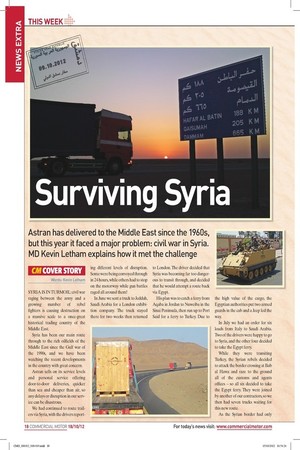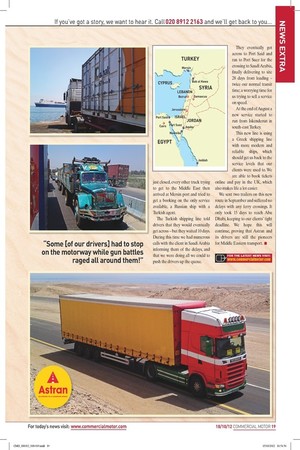Surviving Syria
Page 13

Page 14

If you've noticed an error in this article please click here to report it so we can fix it.
Astran has delivered to the Middle East since the 1960s, but this year it faced a major problem: civil war in Syria. MD Kevin Letham explains how it met the challenge
Words: Kevin Letham
SYRIA IS IN TURMOIL: civil war raging between the army and a growing number of rebel fighters is causing destruction on a massive scale to a once-great historical trading country of the Middle East.
Syria has been our main route through to the rich oilfields of the Middle East since the Gulf war of the 1990s, and we have been watching the recent developments in the country with great concern.
Astran sells on its service levels and personal service offering door-to-door deliveries, quicker than sea and cheaper than air, so any delays or disruption in our service can be disastrous.
We had continued to route trailers via Syria, with the drivers report ing different levels of disruption. Some were being convoyed through in 24 hours, while others had to stop on the motorway while gun battles raged all around them!
In June we sent a truck to Jeddah, Saudi Arabia for a London exhibition company. The truck stayed there for two weeks then returned to London. The driver decided that Syria was becoming far too dangerous to transit through, and decided that he would attempt a route back via Egypt.
His plan was to catch a ferry from Aqaba in Jordan to Nuweiba in the Sinai Peninsula, then run up to Port Said for a ferry to Turkey. Due to the high value of the cargo, the Egyptian authorities put two armed guards in the cab and a Jeep led the way.
In July we had an order for six loads from Italy to Saudi Arabia. Two of the drivers were happy to go to Syria, and the other four decided to take the Egypt ferry.
While they were transiting Turkey, the Syrian rebels decided to attack the border crossing at Bab al Hawa and raze to the ground all of the customs and agents offices – so all six decided to take the Egypt ferry. They were joined by another of our contractors, so we then had seven trucks waiting for this new route.
As the Syrian border had only just closed, every other truck trying to get to the Middle East then arrived at Mersin port and tried to get a booking on the only service available, a Russian ship with a Turkish agent.
The Turkish shipping line told drivers that they would eventually get across – but they waited 10 days. During this time we had numerous calls with the client in Saudi Arabia informing them of the delays, and that we were doing all we could to push the drivers up the queue. They eventually got across to Port Said and ran to Port Suez for the crossing to Saudi Arabia, finally delivering to site 28 days from loading – twice our normal transit time; a worrying time for us trying to sell a service on speed.
At the end of August a new service started to run from Iskenderun in south-east Turkey.
This new line is using a Greek shipping line with more modern and reliable ships, which should get us back to the service levels that our clients were used to. We are able to book tickets online and pay in the UK, which also makes life a lot easier.
We sent two trailers on this new route in September and suffered no delays with any ferry crossings. It only took 15 days to reach Abu Dhabi, keeping to our clients’ tight deadline. We hope this will continue, proving that Astran and its drivers are still the pioneers for Middle Eastern transport. ■











































